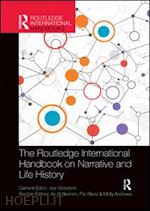1 The Rise of the Life Narrative 2 The Story of Life History 3 How Stories Found a Home in Human Personality 4 Narrative and Life History Research in International Education: Re-Conceptualisation from the Field 5 What have you Got when you’ve Got a Life Story? 6 Techniques for Doing Life History 7 The Story so Far: Personal Knowledge and the Political 8 Always a Story 9 On Coming to Narrative and Life History Section 2: Methodological and Sociological Approaches Introduction In Search of Life History 10 The Quest for Lived Truths: Modifying Methodology 11 Analyzing Novelty and Pattern in Institutional Life Narratives 12 Zeitgeist, Identity and Politics: The Modern Meaning of the Concept of Generation 13 Biography as a Theoretical and Methodological Key Concept in Transnational Migration Studies 14 Culinary Border Crossings in Autobiographical Writing: The British Asian Case 15 Biographical and Narrative Research in Iberoamerica: Emergence, Development and State Fields 16 A Psycho-Societal Approach to Life Histories 17 Working-Life Stories 18 Culturally Available Narratives in Parents’ Stories about Disability 19 Researching Higher Education Students Biographical Learning 20 The Narrative Interview – Method, Theory, and Ethics: Unfolding a Life Section 3: Political Narratives and the Study of Lives Introduction Political Narratives and the Study of Lives 21 Narrative Power, Sexual Stories and the Politics Of Story Telling 22 Immutability Blues: Stories of Queer Identity in an Age of Tolerance 23 Northern Irish Narratives of Protest & Conflict: Back and Forth across the Rubicon 24 Aleksandr (Sasha) Pechersky (1909-1990): In Search of a Life Story 25 Saffron and Orange: Religion, Nation and Masculinity in Canada and India 26 The Experience of Politics: Narratives of Women MPS in the Indian Parliament 27 Making Family Stories Political? Telling Varied Narratives of Serial Migration 28 The Politics of Personal HIV Stories 29 Epistolary Entanglements of Love and Politics: Reading Rosa Luxemburg’s Letters 30 Politics and Narrative Agency in the History of The Victoria and Albert Museum. Section 4: Ethical Approaches Introduction ‘But who is Mrs Galinsky, Mother?’: From Nana Sikes’ Stories to Studying Lives and Careers 31 Ethical Considerations Entailed by A Relational Ontology in Narrative Inquiry 32 Compassionate Research: Interviewing and Storytelling from a Relational Ethics of Care 33 Suspicious, Suspect and Vulnerable: Going Beyond the Call and Duty of Ethics in Life History Research 34 The Ethics of Researching Something Dear to My Heart with Others ‘Like Me’ 35 How Stories of Illness Practice Moral Life 36 The Ethics of Researching and Representing Dis/ability 37 An Act of Remembering: Making the ‘Collective Memories’ My Own and Confronting Ethical Issues 38 ‘The Path is made by Walking on It’: Ethical Complexities in Supervising International Doctoral Researchers Using Narrative Approaches 39 Writing the (Country) Girl: Narratives of Place, Matter, Relations and Memory 40 Ethics and the Writing of After a Fall: A Sociomedical Sojourn 41 Ethics and the Tyranny of Narrative 42 The Door and the Dark: Trouble Telling Tales 43 "Styles of Good Sense": Ethics, Filmmaking and Scholarship 44 Lingering Ethical Tensions in Narrative Inquiry 45 Purpose Built Ethical Considerations for Narrative Research: Broad Consent or Process Consent but not Informed Consent 46 A Relational Ethic for Narrative Inquiry, or in The Forest but Lost in the Trees, or a One-Act Play with Many Endings 47 Narrative Ethics












